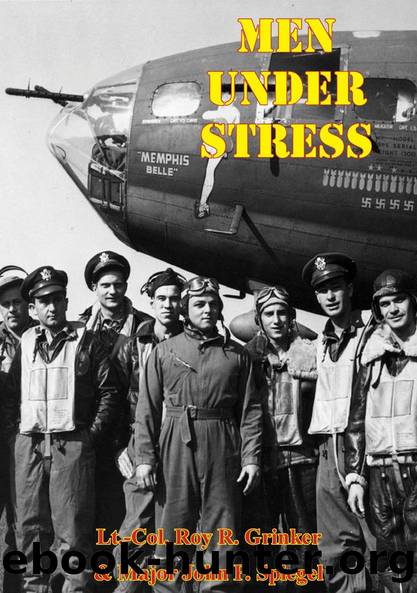Men Under Stress by Lt.-Col. Roy R. Grinker Major John P. Spiegel

Author:Lt.-Col. Roy R. Grinker, Major John P. Spiegel [Lt.-Col. Roy R. Grinker, Major John P. Spiegel]
Language: eng
Format: epub
Tags: History, Military, United States, Europe, General, Germany, Special Forces
ISBN: 9781786256942
Google: ctJvCwAAQBAJ
Publisher: Pickle Partners Publishing
Published: 2015-11-06T05:07:18+00:00
CASE 25: Severe infantile regression secondary to harrowing combat experiencesâanxiety state due to frustrations on return home.
A 24 year old enlisted bombardier had entered the army after graduation from college, where he had maintained average scholastic standing. He was the third oldest of six siblings. There was no history of neurosis in the family or in the patientâs personal life; he had made normal social adaptations. He had gone into gunnery training because he wanted to fly, even though he had been washed out of cadet training because of color blindness. He was eager to go overseas but anticipated his first missions with much nervousness. However, he completed fifty-two missions, many of which were severe. His apprehension continued throughout his tour of duty and was always much worse on the way back from the target. What kept him going was the contemplation of returning home after fifty missions. He was considerably upset when two of his best friends were shot down. Because his ship was always in the worst flak, the boys called him the âflak magnetâ and some refused to fly with him. His last mission was exceptionally severe and his ship had to turn back because of the flak.
The anxiety and tension he felt in combat persisted on his return to the United States. On his overseas furlough at home, he felt irritable, anxious and restless and had difficulty in sleeping at night. His father and brothers annoyed him intensely. He became disturbed when asked to talk to friends and neighbors and refused to speak before local organizations that were interested in his experiences. He became so disturbed at home that he withdrew from all possible contacts and remained in bed as much as possible. Severe dyspeptic symptoms forced him to adopt a milk diet.
On admission, he had marked coarse tremor of both hands, extreme anxiety, severe insomnia, restlessness, irritability and startle reactions. With psychotherapy, narcosynthesis and the release of much anxiety in relation to the battle situation, the patient improved considerably after a hospitalization of three weeks. About the sixth week, when the problem of his return to duty arose, he became depressed, his tremor reappeared and he developed crying spells. Therapeutic interviews were resumed and considerable improvement occurred, until he was ready for discharge.
He then stated that he did not feel that he could continue in the army. He showed a marked amount of resentment against anything military and stated that, when he was around among soldiers or crowds of any type, in movies or restaurants, he developed a coarse tremor which embarrassed him. Yet he did not want to be discharged to his home. Although he had good insight into the psychogenesis of his difficulty, he did not want to accept help, feeling that he could conquer his troubles himself; nevertheless he had many spontaneous attacks of weeping. Nowhere, either at home or in the army, could he envisage gratification of his dependent needs. He vacillated between a whining, weeping cry for help and a
Download
This site does not store any files on its server. We only index and link to content provided by other sites. Please contact the content providers to delete copyright contents if any and email us, we'll remove relevant links or contents immediately.
The Radium Girls by Kate Moore(12026)
100 Deadly Skills by Clint Emerson(4924)
Rise and Kill First by Ronen Bergman(4785)
The Templars by Dan Jones(4689)
The Doomsday Machine by Daniel Ellsberg(4489)
The Rape of Nanking by Iris Chang(4211)
Killing England by Bill O'Reilly(4001)
Stalin by Stephen Kotkin(3965)
Hitler in Los Angeles by Steven J. Ross(3946)
12 Strong by Doug Stanton(3548)
Hitler's Monsters by Eric Kurlander(3341)
Blood and Sand by Alex Von Tunzelmann(3203)
The Code Book by Simon Singh(3189)
Darkest Hour by Anthony McCarten(3129)
The Art of War Visualized by Jessica Hagy(3007)
Hitler's Flying Saucers: A Guide to German Flying Discs of the Second World War by Stevens Henry(2754)
Babylon's Ark by Lawrence Anthony(2676)
The Second World Wars by Victor Davis Hanson(2524)
Tobruk by Peter Fitzsimons(2516)
